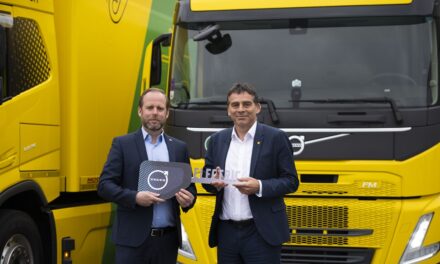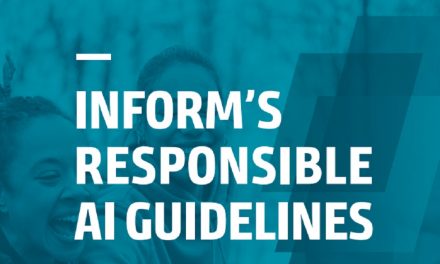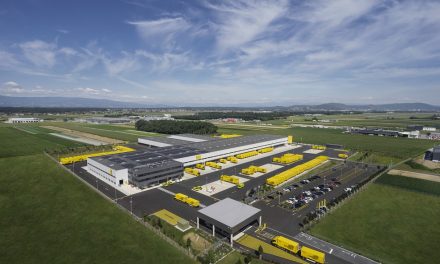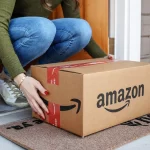
Future vision
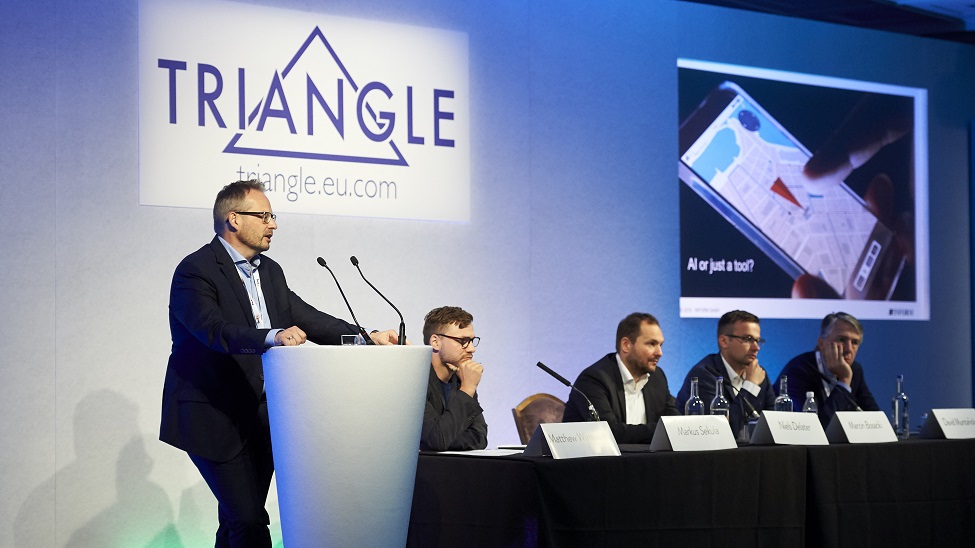
INFORM’s Key Account Manager, Markus Sekula, spoke to Post & Parcel about his background with Hermes Group and how he combines his operator experience and technical knowledge working with INFORM’s leading post and parcel operator accounts.
In this interview he discusses major parcel-sector trends such as the impact of nationalisation and climate change and explains why he thinks operators need to embrace state-of-the-art technology tools like AI to remain competitive.
How does your knowledge of the parcel industry help you with your role?
I started my career in the post and parcel industry after graduating in Business Engineering in Transport Management and Logistics at the University of Applied Sciences in Bremerhaven. After 15 years with Hermes Group, where I was responsible for a broad range of logistics-planning functions, including technology and process planning; I made my way to the supplier side and joined INFORM.
My time with Hermes was very formulative. I had the opportunity to work on multiple projects where I was responsible for engineering the logistics network, including planning and building new hubs and depots. These kinds of projects exposed me to many ideas about the current state of our industry and as well, planning for what the future is going to hold. When you plan and build a new hub, you always have to be thinking, “What will our industry be like in five- or ten-years’ time?” Post and parcel operators make significant investments in new hubs, and you need to be sure you’re going to get a return on that investment.
In my time with Hermes and even since joining INFORM, I’ve also had the opportunity to continue learning. I get to meet a lot of very smart people on both the supplier side and operator side of the selling equation, and this keeps me on my toes.
How do you envisage the future of parcel logistics?
For traditional post and parcel operators, it is no secret that economically speaking, their business model is shifting from being a traditional postal business into a parcel-delivery business model. And as a result of this shift, I think that many operators expect to see a bright future ahead. Add in the parcel-focused operators, and they are all seeing that parcel volumes, in general, are on the rise year-on-year, and subsequent revenues in the parcel vertical are also up, albeit only slightly in many cases. Parcel volume increases are driven by the rise of e-commerce giants like Amazon and Alibaba and underpinned by social and cultural shifts in how we source and consume goods. That’s the good news.
The bad news is that these major technology operators are both introducing their own delivery operations into the mix and increasingly commoditising the parcel-delivery services offered by traditional operators. The combined effect of increased competition and price volatility should be driving parcel operators to ask some tough questions about whether it is all “blue skies” ahead.
Yes, it is true that traditional post and parcel operators have an unmatched experience base and definitely a head-start on infrastructure investment that should benefit them in the short-run. But, they need to keep in mind that these new players have an unfair advantage – they’ve grown-up, so to speak, with technology, like AI and Machine Learning, as part of their very foundation, and these technologies don’t play fair. An AI platform can learn in months what it takes a human years, decades even, to learn and master.
Sorry, hearing myself speak, it sounds all doom and gloom but it really isn’t. We’re seeing many parcel operators being proactive here – investing in technology, in startups, in the future, and I think these sorts of investments, while challenging and sometimes outside of the norm for our industry, are going to pay dividends in the medium- and long-terms.
Picking up on investment in technology, what role should tech play in logistics operations?
Technology is at the core of any innovative, modern business. Take post operations – the proliferation of email has slowly, but surely, made what was once the cornerstone of communication, the “letter,” almost irrelevant. Most businesses driving the market aren’t talking about sending out catalogues to customers. No, they have an AI platform reinforced with Machine Learning to know everything about you as a shopper to serve up what you want to buy before you even know it. Ironically, some companies are still using direct mail campaigns to cut through the digital noise, but the important takeaway is that the AI is driving the insights that drive the campaigns that fuel the business.
Forget the old brick-and-mortar asset models of accounting. As logistical operators, we need to be matching that level of technological investment to both remain competitive and relevant. Today, any part of a parcel operators’ operation that isn’t digital or optimised, isn’t helping that operator learn and improve, is a cost on their books – not an asset. Operators need end-to-end digital operations, ideally utilising state-of-the-art technology tools like AI, Machine Learning, Augmented Reality, etc. to really stay competitive.
What drew you to INFORM?
I worked with INFORM for nearly 10 years on the operator side, and I learned to appreciate their knowledge, flexibility, and performance as a reliable partner. I took the decision to expand my knowledge beyond the operator side and move to INFORM. As an employer, they really stand behind their team and empower us to continue learning and to push the envelope of what is possible with our products and solutions.
At INFORM, I get to combine my market knowledge and operator experience to help them build a better product offering as well as helping our customers and potential customers leverage our solutions to meet their challenges.
What are the key challenges for the sector, and how can INFORM help?
I’ve already touched on the need to understand the new competitors entering the logistics markets that are enabled by technology. This is for sure a key challenge. But, there are other challenges from society and from inside our industry.
The growth in parcel volumes is also going to strain investments in logistics networks and understanding how to grow and contract delivery networks is going to prove relevant in the coming years. This too will be further complicated by shifts in consumer demand.
Geopolitically speaking, if we continue on our current trend of nationalism first and globalisation second, we’re likely to continue see the effects of ongoing trade wars and shifting supply and demand of goods. What impact this will have on delivery networks is yet to be seen, and it will beg the question how you will make plans that are scalable, both up and down, to accommodate these ebbs and flows while still getting a solid return on your investments.
The environment and the impact of climate change are also starting to show that they aren’t to be ignored. Many large cities, particularly in Europe, are looking at ways to reduce traffic, congestion, and CO2 emissions, and many are evaluating reducing or removing vehicles altogether from their central city areas. As an industry, I think it is fair to say that we’re seeing this one coming, but we still haven’t developed a good model of how to manage it. We still haven’t figured out how to cooperate with our competitors, which is what I think will be required. It also begs the question of whether it will further exacerbate the question of commoditisation of our services.
Finally, probably the best known and perhaps the best-understood challenge is the search for alternative models for last-mile delivery. At INFORM, we haven’t turned our 50 years of optimisation experience to the post and parcel sectors last-mile challenge. But in truth, I think optimisation can only go so far here, and we’re going to hit a hardline limit on the ability for parcel operators to deliver packages directly to consumer’s doors. A single failed delivery can, even today, mean the difference between making profit, breaking even, or losing money. The rise of parcel lockers and drop-off/pick-up locations are good alternatives, but they do require changing the consumer’s mindset about the benefits of e-commerce (i.e., convenience of home delivery). On a side note, it still amazes me that there aren’t purpose-built, parcel-drop facilities being included in new home projects yet.
Why is a Yard Management System (YMS) an important investment for logistics operators?
I say it again, forget the old brick-and-mortar asset models of accounting. Those that think having an infrastructure in place gives them an advantage will discover they are sadly mistaken in the years to come. Those operators who think ‘brand value’ will see them through the Amazon/Alibaba-wave, are in for a rough ride. Research has shown time and time again that in general, customers don’t care who delivers their parcel; they only care that it turns up in an ever-narrowing time window. Parcel operators must remember that we exist to serve the customer, and the customer of today is online – they’re digital. And this trend will only increase as Millennials and Alphas become the main consumers of goods.
So, it all comes full circle to digitisation. It doesn’t matter what the accounting department says because the reality is, an under-productive hub in your network is a liability, and the last thing parcel operators ever want to talk about are their yards. The simple truth is, though, the yard is the gateway between the road and your sorter. Decisions here can have a real impact on hub efficiency and productivity and even reach much further out into your broader network and onto the last-mile.
Any YMS is a good start. But, like all things, you get what you pay for. An AI-empowered YMS can help keep the gates to your operations open and the gears well-oiled. When equipped properly, they can even help you milk peripheral assets like yard trucks and your sorter generating an even higher ROI. The experience of our customers consistently shows efficiency gains at hubs of 40% and higher and an ROI measured in months. What other asset gives you a 100% ROI in less than a year? While it is one of the last conversations parcel operators want to have, the reality is a smart YMS is low-hanging fruit that will help them milk their assets and position themselves competitively in the market.
What advice would you give the sector considering AI and optimisation software?
Firstly, AI isn’t as scary as it sounds. Niche AI has been around for decades, and, in fact, it is very mature when working with established companies like INFORM. Last year, we were named one of the 20 “most promising AI providers globally.” It is also worth noting that AI and optimisation software isn’t designed to take humans’ jobs away. One could argue that with the software doing the heavy lifting and decision-making of routine tasks that there isn’t a need for humans, but again, our customer case studies don’t show this at all.
AI systems can build up the experiences of past operations and make them always available to support the present, real-time operations. In this way, employees are supported to improve the overall decision-making processes and can be relieved from routines so they can concentrate on the rare events and special services e-commerce customers are now starting to expect as standard.


